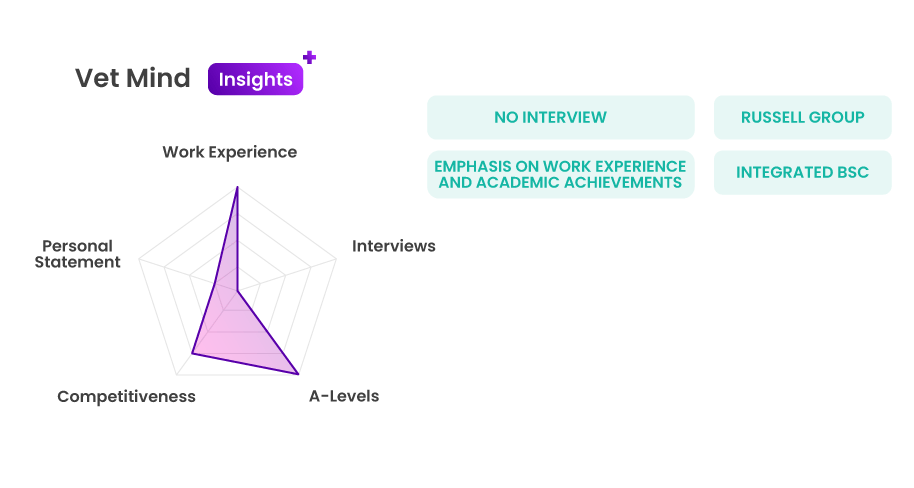Liverpool Institute of Veterinary Science

Overview
The University of Liverpool’s first Veterinary School was the first of the UK Veterinary Schools to be part of a university, and the first to offer a degree in veterinary science. Building on this outstanding tradition, now the Institute of Veterinary Sciences, the Institute today has a continuing commitment to innovative veterinary education and research, giving students a fantastic start to their veterinary careers. Like many veterinary schools, Liverpool operates on a dual campus basis. One campus is located in the heart of Liverpool and this is where you will do the majority of your science and theory based learning for the first 3 years. The other campus (Leahurst), is the location of your year 4 and 5 studies and also the home of it’s world renowned equine centre.
Table of Contents
ToggleKey points
- Leading equine centre
- Research-led teaching
- Prestigious university

FAQs
The Liverpool Institute of Veterinary Science (LIVS) is a leading veterinary school located in Liverpool, UK. It is part of the University of Liverpool and offers undergraduate and postgraduate programmes in veterinary science.
LIVS offers a Bachelor of Veterinary Science (BVS) programme, which is a five-year programme that prepares students for a career in veterinary medicine. It also offers a BSc in Veterinary Conservation Science, which combines veterinary science with conservation biology.
LIVS offers a range of postgraduate programmes, including taught MSc programmes in One Health, Livestock Health and Production, and Veterinary Science. It also offers research degrees, such as MRes and PhD programmes, in a range of veterinary-related areas.
The admission process for the Liverpool Institute of Veterinary Science varies depending on the course being applied for. For the BVSc programme, students must apply through UCAS and meet certain academic requirements, while postgraduate applications are made directly to the University of Liverpool.
Yes, the Liverpool Institute of Veterinary Science offers a range of scholarships and financial aid options for students. These include merit-based scholarships, need-based scholarships, and student loans.
The Liverpool Institute of Veterinary Science has a strong research focus across a range of areas, including infectious diseases, cancer biology, animal welfare and behaviour, and veterinary education.
Graduates from the Liverpool Institute of Veterinary Science are highly sought after and have excellent job prospects. Many go on to work in private practice as small animal or large animal vets, while others work in research, academia or government positions.
The Liverpool Institute of Veterinary Science (Livestock) is a highly competitive veterinary school, and the admission process is rigorous. The exact difficulty of getting into the school depends on a number of factors, including academic performance, extracurricular activities, and experience in the veterinary field.
For the Bachelor of Veterinary Science (BVSc) programme, applicants are expected to have achieved high grades at A-level or equivalent, with a strong emphasis on science subjects. The application process also involves submitting a personal statement and references, as well as attending an interview.
The selection process for the BVSc programme is highly competitive, and the school receives many more applications than it has places available. However, meeting the minimum academic requirements does not guarantee admission, as the school also considers factors such as personal qualities, work experience, and extracurricular activities.
Overall, getting into the Liverpool Institute of Veterinary Science is considered challenging, but not impossible. Students who have a strong academic record, relevant experience, and a passion for the field of veterinary science will have the best chance of success.
About the university
| Key Information | |
| Website | https://www.liverpool.ac.uk/veterinary-science/ |
| [email protected] | |
| Phone number | +44 (0)151 794 4797 |
| Course Information | |
| Teaching style | Traditional and research-led Whilst it follows the traditional 3 years non-clinical 2 years clinical route, the university of Liverpool will teach your practical skills from day one by taking advantage of their facilities to develop handling and basic clinical skills such as suturing. Teaching proper communication is of great importance to the institute therefore you will be putting this into practice with professional actors who act as your clients in simulated veterinary consultations. This is all built upon further in the second year and third year however the structure of teaching of year 3 integrates a research project, thus developing your research skills. The variety of facilities at the veterinary campus (Leahurst) allows you to develop a healthy balance of skills in different veterinary areas. This is where you will learn during your fourth and fifth years and after the final exams you have the chance to choose an elective subject to study in greater depth allowing you to practise as a vet whilst benefiting from the support/expertise of the staff at the site. |
| Course length | 5 years |
| Courses offered | 2 courses offered Foundation to Health and Veterinary Studies Veterinary Science BVSc (including the option to intercalate). |
| Graduate entry | Yes |
| Foundation or access | Yes The University of Liverpool's Veterinary School is involved in a widening participation scheme which allows for contextual offers based on individual circumstances, a foundation course as well as pre-approved 'access to higher education' diplomas. Contact the university for more information or to see if you are eligible. |
| University Life | |
| Local area | Liverpool The main campus, where you will spend your pre-clinical years, is located in the heart of the city of Liverpool - an incredibly vibrant, friendly and historical city. The Leahurst campus, located in the countryside surrounding Liverpool will be the location of your clinical years and consists of all things veterinary from its teaching animal hospitals to its leading equine centre. Not too far from each campus is Chester zoo which has strong ties with the university. |
| Social life | Liverpool is very well known for its entertaining night-life and since you’ll be based in the heart of the city, you’ll be in the centre of the fun. There’s also a number of interesting scenic spots and historical locations which may interest you for a day out such as the Royal Albert Dock where you can find places like the Liverpool Tate art gallery and the Slavery Museum. You can also expect interesting excursions organised by the University itself which will take you all over the country. |
| Interview | |
| Interview style | MMI |
| Interview dates | November – December |
| Admissions Tests | |
| UCAT | N/A |
| GAMSAT | N/A |
| Academic Requirements | |
| GCSE | Subjects Required: Mathematics, English and Physics (at grade A/B or above). Grades Required: minimum of seven GCSEs at grades AAABBBB/7776666 or above, including Mathematics, English and Physics (either as a separate subject or as Dual Award Science) are required. |
| A-level | Subjects Required: Biology/Human Biology, a choice between Chemistry, Physics, Mathematics, Geography, Geology or Psychology and a third subject of your choosing. If the second subject is not Chemistry then a B is required in AS Level Chemistry. Grades Required:AAA |
| Scottish Advanced/Highers | Subjects Required: Biology and Chemistry. Grades Required: AAAAB |
| IB | 36 points Subjects Required: Chemistry, Biology and any other subject at Higher Level. Grades Required:36 with 6 in HL Chemistry and HL Biology and 6 at HL in any other subject. |
| Bachelor's Degree (Gradutes Only) | Grades Required: Graduates are required to have an upper second class (2:1) degree, and A levels in Biology and Chemistry (grades BB for BSc graduates; AA for BA graduates). |
| Statistics | |
| Number of applicants per interview | |
| Number of applicants per place |








